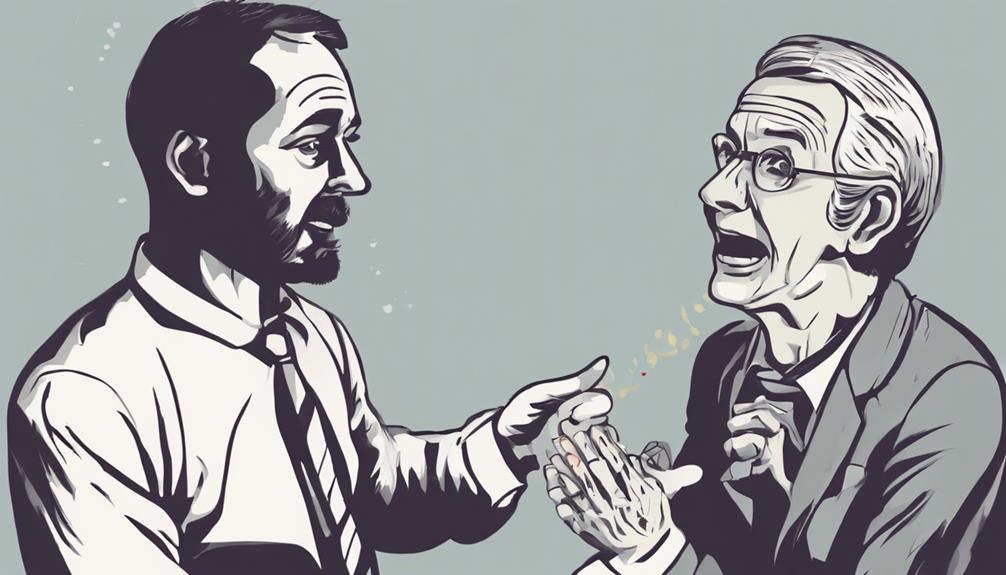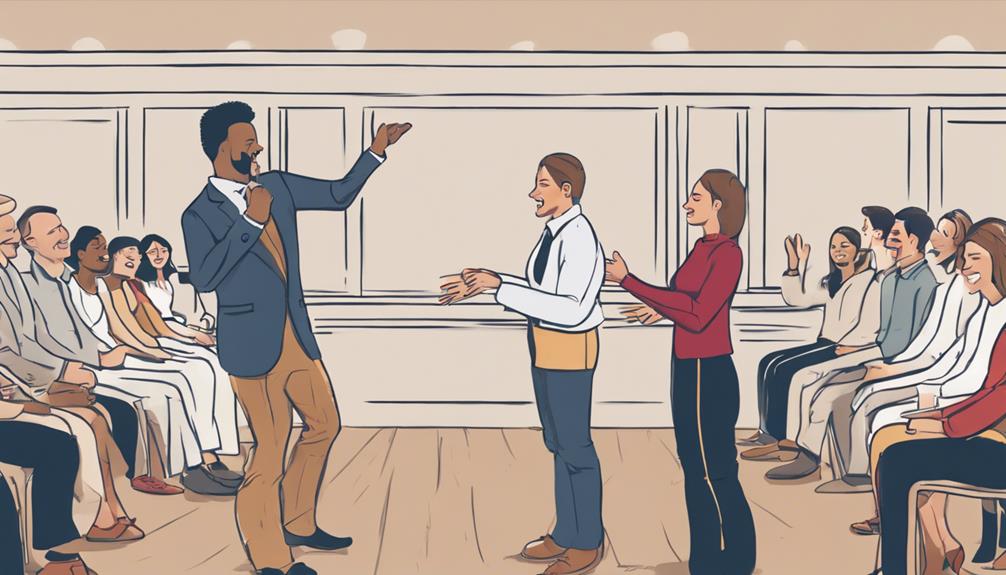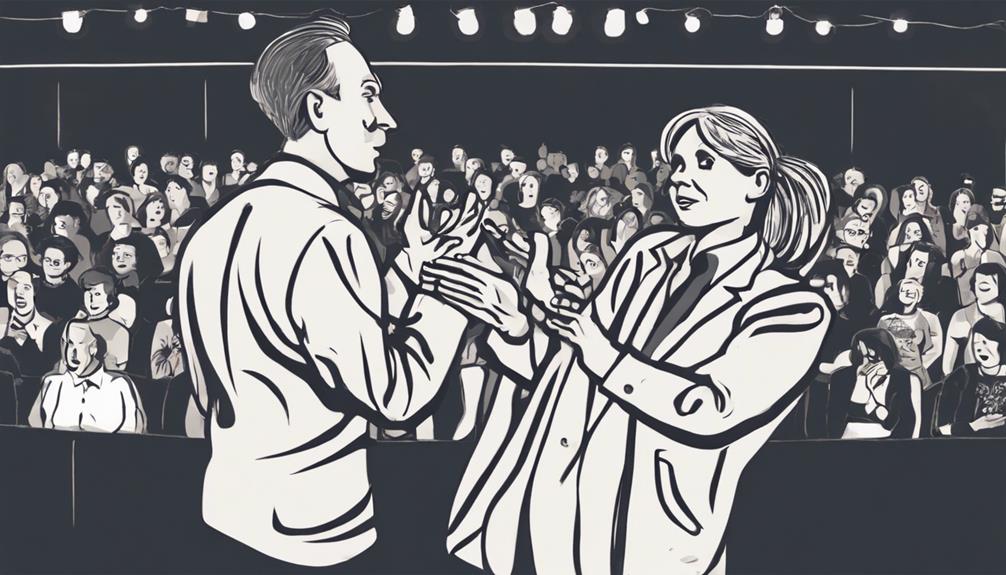Stage hypnosis relies on volunteer participation, dispelling misconceptions about mind control. Contrary to belief, hypnosis does not involve sleep-like unconsciousness. Participants remain aware of their surroundings and have the agency to reject suggestions. Safety is paramount, with trained professionals ensuring a controlled and hazard-free environment. The hypnotist merely guides participants through heightened suggestibility, emphasizing their well-being. To further understand the dynamics of stage hypnosis and debunk common myths, exploring the nuances of volunteer participation and safety measures is crucial.
The Truth About Mind Control

Contrary to popular belief, stage hypnosis does not involve actual mind control, but rather a combination of suggestion, compliance, and the power of suggestion. Participants in stage hypnosis shows willingly engage in the experience, understanding that they retain their free will throughout the performance.
The hypnotist uses techniques to induce a state of focused attention, heightened suggestibility, and relaxation, allowing individuals to become more receptive to the suggestions given. It is crucial to differentiate between entertainment hypnosis and therapeutic hypnosis.
Entertainment hypnosis aims to provide amusement and laughter for the audience, often incorporating humorous suggestions and playful scenarios. On the other hand, therapeutic hypnosis focuses on utilizing hypnosis as a tool for personal growth, behavior modification, and addressing psychological issues.
Understanding the distinction between entertainment and therapy is essential in dispelling misconceptions surrounding stage hypnosis and acknowledging the role of free will in the hypnotic experience.
Debunking the Sleep Myth
An examination of stage hypnosis reveals that the common belief equating hypnotic states with sleep is a misconception that requires clarification. Hypnosis debunked as a state of sleep arises from the outward appearance of relaxation and stillness often exhibited by individuals under hypnosis. However, numerous studies and empirical evidence indicate that the brain activity during hypnosis is distinct from that of sleep.
While hypnosis can induce a trance-like state characterized by focused attention and heightened suggestibility, it does not involve the complete loss of consciousness or the same brain wave patterns as sleep.
This sleep misconception stems from the misinterpretation of the hypnotic state as a form of unconsciousness, when in reality, individuals under hypnosis are fully aware of their surroundings and the hypnotist's instructions. By debunking the association between hypnosis and sleep, a clearer understanding of the hypnotic process emerges, emphasizing its unique psychological dynamics separate from those of sleep.
Separating Fact From Fiction

How can we discern between the truths and misconceptions surrounding stage hypnosis? By debunking misconceptions and exploring reality, we can gain a clearer understanding of this intriguing form of entertainment.
One common misconception is that stage hypnosis involves the hypnotist taking control of the participants' minds against their will. In reality, participants in stage hypnosis shows are willing volunteers who are fully aware of their actions. The hypnotist acts as a guide, facilitating a state of focused attention where participants are more open to suggestions.
Another myth surrounding stage hypnosis is that it is dangerous and can have long-lasting effects on participants. However, research has shown that stage hypnosis is safe when performed by trained professionals who adhere to ethical guidelines. Participants are not put into a trance-like state that leaves them vulnerable; instead, they are in a heightened state of suggestibility that allows them to engage in playful and entertaining activities.
Understanding Hypnosis Safety
Safety considerations are paramount when exploring the practice of stage hypnosis. Safety precautions must be meticulously followed to ensure the well-being of participants.
Before engaging in any hypnotic demonstrations, it is imperative for stage hypnotists to prioritize participant consent. This involves clearly explaining the nature of the performance, the potential effects of hypnosis, and obtaining explicit permission from each volunteer before proceeding.
When it comes to safety precautions, it is essential for stage hypnotists to create a safe and controlled environment for their participants. This includes ensuring that the stage is clear of any hazards, the participants are seated or positioned securely, and that there is medical personnel on standby in case of emergencies.
Additionally, it is crucial to monitor the participants throughout the hypnosis session to promptly address any signs of distress or discomfort.
Exposing Common Misconceptions

Dispelling misconceptions surrounding stage hypnosis requires a thorough examination of prevalent myths and misinformation in order to provide accurate insights into this intriguing practice.
One common misconception is that hypnotic entertainment involves the hypnotist having complete control over the participants. In reality, stage hypnosis is based on the principle of voluntary participation. Participants willingly agree to engage in the experience, and they retain the ability to reject any suggestion that goes against their morals or beliefs.
Another misconception is that audience members under hypnosis are in a state of deep sleep or unconsciousness. In fact, individuals in a hypnotic state are fully aware of their surroundings and can hear and respond to the hypnotist's instructions.
Furthermore, audience participation in stage hypnosis is typically characterized by a heightened sense of focus and suggestibility rather than a loss of consciousness.
Frequently Asked Questions
Are Stage Hypnotists Using Real Hypnosis or Just Actors?
Stage hypnotists employ a combination of real hypnosis and performance techniques. The ethical implications of influencing individuals without their full awareness and consent are significant. Legal considerations mandate obtaining participant consent to ensure a safe and responsible show.
Can Anyone Be Hypnotized Against Their Will?
When considering the ability to hypnotize someone against their will, ethical concerns arise regarding consent issues. In the realm of hypnosis, respect for autonomy and ensuring voluntary participation is paramount to ethical practice.
Do People Remember What Happens During a Stage Hypnosis Show?
Memory retention during a stage hypnosis show varies among participants. Some may recall the experience vividly, while others may have fragmented memories or none at all. Audience perceptions of participant experiences can differ based on individual suggestibility levels and post-hypnotic suggestions.
Is Stage Hypnosis Dangerous for Participants?
Stage hypnosis can pose risks to participant safety due to potential psychological effects and consent issues. Ethical concerns arise regarding the manipulation of individuals under hypnosis. Rigorous guidelines and professional conduct are crucial for ensuring participant well-being.
Are the Reactions of Volunteers on Stage Genuine or Staged?
Volunteer participation in stage hypnosis raises questions of authenticity among audience members. While skepticism may exist, research suggests that volunteers' reactions are a combination of suggestibility and performance, blurring the line between genuine and staged responses.
Conclusion
In conclusion, it is important to dispel the myths surrounding stage hypnosis and understand the true nature of the practice.
By debunking misconceptions, such as mind control and sleep induction, we can appreciate the art of hypnosis for what it truly is: a safe and effective tool for entertainment and therapeutic purposes.
It is crucial to approach hypnosis with a critical lens and educate oneself on the facts to distinguish between reality and fiction.
